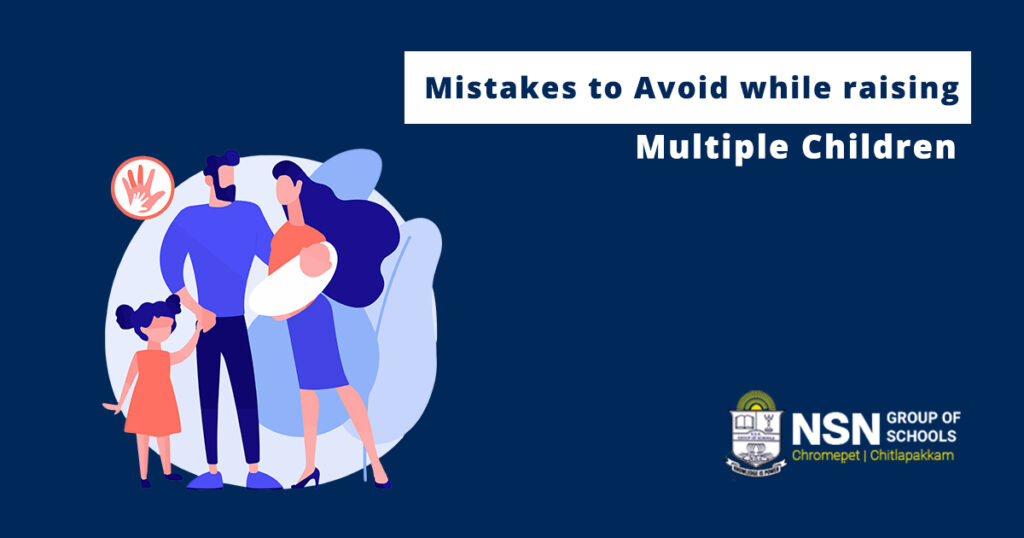
Parents are mostly not inclined to make errors but sometimes they depend only on their parenting instincts and do not seek professional assistance with typical parenting concerns and problems. Unfortunately, many of them do not naturally know what to do in every circumstance that they experience as parents, which leads to blunders from time to time when parenting multiple children. There are no two people who are precisely alike. This becomes clear practically after a second baby is born. Raising multiple children is interacting with a variety of individuals who want your assistance for a variety of reasons, but those reasons have nothing in common, so your children may continuously tug you in various directions.
Let’s take a look at some of the common mistakes to avoid while raising multiple children.
Overestimating or underestimating
It’s detrimental to children. It starts all at home when one sibling has done something better than the other. One gets praise and the other is being scolded and compared, leaving a sense of overconfidence in one and a scar on the other. Later, it continues with the grades and marks scored in school. Some parents go to an extent as to enroll one of their children in one of the best schools and the other in a less preferred one. It is crucial to realize that informing your children that one is better than the other will not improve their lives. On the contrary, it will have an influence on the child’s self-confidence who is being underestimated, which will, in turn, impact his productivity. It is preferable if you sit with your children and assist them in determining if they are able or unable to accomplish. Comparing their children is one of the biggest errors parents can make, and it may leave a permanent mark on their child’s growth.
Having unrealistic expectations
If you have unrealistic expectations of what your children should do, you may cause issues. This can happen when parents become irritated or angry with one or all of their children. Make sure your expectations are in line with what your children are capable of or expected to do at their developmental stage.
Using a “one-size fits” approach
We jump to conclusions about supporting practices and situations far too often without questioning if they are adapted to the individual needs of the children. A more tailored approach to child-rearing according to the individual needs of every child must be adapted. It is the responsibility of parents to identify a child’s unique idiosyncrasies and adjust punishment and rewards to meet their requirements.

Not attempting to resolve issues
Many parents experience months or years of difficulty dealing with common issues, either because they feel some problems are unfixable or because they are too inclined to accept them. Bedtime disagreements, frequent nocturnal awakenings, temper outbursts, and behavioral issues in older children are manifestations of this as they start feeling a sense of domination over the younger ones. Although your babies did not arrive with instructions, there are numerous books, sites, and people that can help you navigate the difficulties of parenthood. When dealing with more difficult or chronic difficulties among one or all of the children, your pediatrician and other health professionals might be of assistance.
Taking sides while arguing and fighting
Sometimes parents fight on behalf of one child with the other by becoming enraged, shouting, or repeating themselves. Fighting or arguing with any of your children draws unwanted attention to you and offers them a lot of power over you since they can evoke such strong reactions. Fighting back will result in you “inadvertently boosting the behavior you’re attempting to curtail” rather than terminating undesirable habits. Just like how the teachers of NSN Schools never take sides of one child over another, it is required to inculcate the same character in parents. Instead of fighting back on the behalf of one child, you could be better off ending power struggles and implementing more effective disciplinary measures, such as time-out and imposing logical and natural repercussions, rather than wasting so much time disputing.
Expecting perfection
It’s natural to want all your children to strive for greatness and excel in everything. That, however, is not how things operate. Raising the standard too high seeing one of your children excel may lead to challenges for other children with self-esteem and trust later in life. Create mental fortitude in your children by setting reasonable expectations. Even if one of your children does not meet goals, the challenges he/she confronts will teach essential life skills and how to achieve them the next time.
Conclusion
Parents can make mistakes in raising their children. It’s reasonable to want the best for your children, and you might just do things that appear to be excellent ideas at the moment but have unexpected implications later on. It’s easy to get frustrated and feel like you’re the only one who’s having trouble with children, but knowing which mistakes are most common can help you correct them while raising multiple children. It’s also a smart option to improve communication with kids by questioning them about how they want things to proceed and whether or not they comprehend your aspirations for them. The most common mistakes parents make in raising multiple children are not understanding their child’s need for independence and being too controlling. The Best Schools in Chennai counsel parents on how to raise multiple children so you can always seek guidance from the teachers who are involved in teaching your children.
